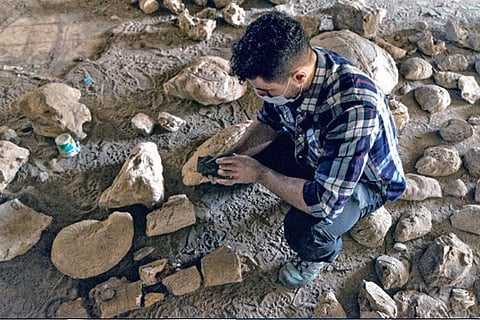

Chennai
He and his colleagues travelled to the phosphate mines around the city of Gafsa, where 56-million-year-old rocks record a time of rapidly warming oceans and mass extinctions, particularly of apex predators like sharks.
Bazzi made some distinctive choices for this palaeontological expedition. For starters, his team hired Tunisians to help dig, rather than bringing students from his university. Bazzi and his colleagues also chose to reach out to the residents of Gafsa wherever possible, holding impromptu lectures on the area’s fossil history to interested onlookers. This was a contrast with the secretiveness of many paleontologists in the field, who might worry about their sites being raided for the fossil black market.
The fossils the team collected from Gafsa are important for learning more about how animals adapted to the hothouse world of the Eocene, a period that may foretell what’s in store for the planet in coming years if carbon emissions don’t slow. But while Bazzi’s team removed the fossils from Tunisia, they did so under an agreement with local institutions that Bazzi himself insisted on: After he finished his research, the remains would be returned.
Historically, these specimens are seldom returned, and locals may never see them again. But Bazzi and his colleagues are part of a movement among the next generation of palaeontological researchers, one attempting to change scientific practices that descend directly from 19th century colonialism, which exploited native peoples and their natural histories.
Over the last few decades, multiple countries have demanded the return of looted art, antiquities, cultural treasures and human remains from museum collections in North America and Europe. Countries such as Mongolia and Chile have likewise demanded the return of collected fossils, from tyrannosaur bones to the preserved remains of giant ground sloths.
“There’s a consistent pattern with these specimens of high scientific or aesthetic value, where they’re taken out of the developing world and shipped abroad to be displayed and shown to a wider audience elsewhere,” Bazzi said. “There should be some balance so that local parties have a say in what happens to them.”
Many countries with less money to spend on funding their own scientists are home to important fossil deposits that could drive major advances of our understanding of the prehistoric world. If the field of palaeontology is to move forward, these researchers say, it’s important to figure out how to study specimens in these places without extending colonial legacies. That will take the development of a different approach to the field, more like the ones being tried by Bazzi and other scientists that rely less on extraction and more on collaboration with and the development of local institutions. According to Emma Dunne, an Irish palaeontologist at University of Birmingham in England, European scientists were part of a colonial network that sucked natural wealth — including fossils — into imperial capitals.
Elbein is a journalist with NYT©2020
The New York Times
Visit news.dtnext.in to explore our interactive epaper!
Download the DT Next app for more exciting features!
Click here for iOS
Click here for Android